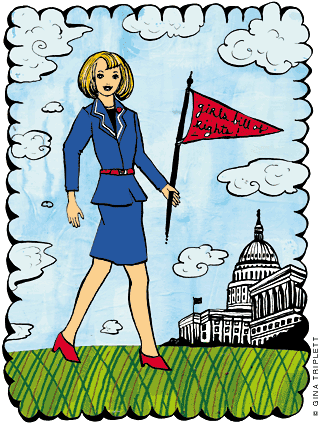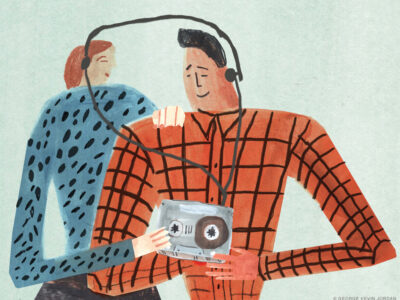
Does a Generation Gap endanger feminism’s future?
By Alison Stein | Sporting pointed-toe pumps, a blue power suit, and a conventional blond bob, White House Barbie hit the shelves just in time to run for president in the 2000 election. The candidate championed a Girls’ Bill of Rights, including “the rights for girls to be themselves and to be president.” Also obtainable in Latina and African-American versions, White House Barbie was a tremendous success. In fact, she was re-released to run with John Kerry and George Bush in this year’s presidential race.
White House Barbie should make our foremothers proud. The crowning achievement of second-wave feminists—women in the 1960s and 1970s who marched for equal pay, equal work, and reproductive rights—was to give women choices. So isn’t this what White House Barbie is all about? Giving women the choice to be president?
Yet, at a national meeting of feminists after the doll was released, only the younger women in the room cheered Barbie’s success. This was not what a feminist was supposed to look like. “Some women felt that the image of Barbie was bimbo-ish and therefore this was an inappropriate and unrealistic role model for young women,” says Martha Burk, chair of the National Council of Women’s Organizations.
Marie Wilson is director of the White House Project, a non-profit organization that “works to create a climate in America where it is normal for women to be governors, CEOs, and president.” She partnered with Mattel to create White House Barbie.
“I have always had a practical bent about how you make change,” Wilson told me in a phone interview. “I know some of my colleagues were uncomfortable with the doll, but we have to go to the places that actually affect people’s lives.” With three Barbies sold per second, dolls are certainly where girls are.
The White House Barbie controversy reflects a larger generational divide in the feminist movement. I personally experienced this divide when I came to Washington to work in women’s organizations after graduating from Penn. During one of my first days of work, I was in the kitchen with a senior-level staff person, heating up lunch, who said, “Wow, Alison. I’ve never met a feminist who wore high-heeled shoes. You remind me of—what’s her name? Oh yeah, Legally Blonde.”
I was stunned and hurt, but mostly confused. If feminism’s main goal is to bring equality to all women, why shun those the movement hopes to bring on board? If feminists’ aspiration is to allow women to lead their lives however they choose, why have knee-jerk reactions to sorority sisters and stay-at-home moms? By being exclusive about “who is a feminist,” are these feminists undermining their original vision?
I told one senior woman that I was planning to accompany my boyfriend when he starts medical school—because he had moved to D.C. so I could work in women’s policy. She turned to me with a disappointed look and said, “You don’t strike me as the type who would follow around her boyfriend.” Apparently, it was OK for my boyfriend to follow me to Washington, but not for me to respond in kind.
As founder of the Younger Women’s Task Force, a professional coalition of younger women working in women’s organizations, I asked 20 of my peers at a recent meeting if they felt there was a divide in the feminist movement, and if they felt it could be more inclusive. The answers were unanimous: yes and yes.
While the feminist movement works on issues like reproductive rights and domestic violence, it is often more everyday concerns that make many younger women identify with feminism. For example, most of my friends pay $30 to $50 a month for their birth-control pills because they are not covered by most health-insurance plans. While the women’s movement has recently taken on this battle, there were many years when younger women felt this concern was being marginalized. Another friend of mine was asked about the ring on her left hand during an interview for a paralegal job. When she told the interviewer she was engaged, she was asked where her fiancé was working. She now takes off her ring for all job interviews, even though these questions are technically illegal.
During the second wave of feminism, women fought to reverse blatant forms of discrimination. They went into jobs expecting to have to fight to make as much as their male counterparts. One woman I work with could not get her own credit card because her ex-husband refused to co-sign. But many young women argue that the feminists are framing today’s battles around issues that, at least legally, have already been won. While the old measure of equality was enjoyment of basic legal rights, the new measure is inclusion in all places and institutions where people make decisions about the way women live. Some young women believe we need to redefine feminism, even if that means dropping the term itself.
“Reproductive rights has become the issue,” said a younger woman working in a women’s organization. “We fight so that women do not have to have their child if they don’t choose to. But I have a child. And I do not have paid maternity leave, and I can’t afford basic childcare.” Many women’s organizations claim that they are so strapped for funding that they cannot afford to give paid maternity leave or paid sick leave. Younger women see this as inherently problematic.
A Latina woman working in another women’s group expressed frustration that the feminist movement has not been sensitive to the cultural identities of many younger women.
“There is still a lot of cultural conservatism among young Latina women,” she said. “This is why, even though I work in a women’s organization, I would never call myself a feminist. For me feminism sounds like you are ‘anti-men,’ and in my culture, we value our men and embrace our differences.”
“I fight for equal rights, but I am not a feminist,” said an African-American woman who is only 33 but runs her own organization. “Feminism is too anti-men. I always wonder, if these women end up getting all the power, would they really treat men well? I fight for the rights of people who are poorly treated, and in my field, it happens to be women.”
In addition to a generational divide, many young women talk about a “pop-culture schism” in the feminist movement. They feel we need to use new tactics to raise awareness of our issues because, for the most part, movement politics and marching are dead. But just as Wilson drew some opposition to her White House Barbie effort, many younger women face opposition from their supervisors when they try to access avenues of popular culture.
“Feminists need to start using the Internet,” said a younger women with whom I work. “But often, when I suggest using a website or blog, my supervisor says, ‘Well, what about a brochure or a printed report?’”
Unfortunately, these generational disconnects can also play out in the workplace. Many younger women hope that a sense of camaraderie and appreciation will compensate for the small paychecks, long hours, and limited benefits that accompany working in women’s organizations. But some younger women believe that the older generation is not invested in developing the next generation of women leaders.
“My supervisors tell me that they want me to assert myself and try to experience all that I can,” said a young woman in the movement. “Yet, when I say too much in a meeting, I am told that I am too pushy and don’t know my place on the ladder.” This same woman gets her boss lunch and Starbucks lattés almost every day.
Some older feminists feel that younger women have unrealistic expectations. “Sometimes, younger women expect way too much in terms of salary and job responsibility for their experience and level of expertise,” said a feminist-movement veteran of more than 30 years.
Why do older women behave in ways that make younger women feel undervalued? One specialist in women’s leadership development, who has been working in the feminist movement for more than 40 years, labeled the phenomenon “battle fatigue syndrome.”
“Second-wave feminists’ lives have been ones of constant struggle—professionally, politically, even intellectually. I think having struggled so much to get where they are often makes them closed-minded. If you work so hard to arrive at a particular place, you don’t want to hear that that place has problems or needs changing.”
Others see the divide as the “pay your dues” syndrome compounded by the theory that older women view younger women as a generation of privilege—with no idea, for example, just how quickly Roe v. Wade can be overturned.
I see it mostly as a problem of communication. Women’s organizations are so strapped for funding, resources, and staff that often there is no time for communicating. If senior women did take the time to get to know younger women, they would discover the issues that resonate with the new generation of feminists. For example, when speaking with me, they would discover that what makes me a feminist is the fact that society has not made a place for me to have it all—a fulfilling career, the love of my life, and children. But more importantly, they would discover that I do recognize how hard they have worked for the rights that I now enjoy. They would discover that I chose to work in the feminist movement because of them.
I currently work for two women in their early sixties. They came to the professional women’s movement later in life. One was a psychologist, and while she had always been active in the feminist movement, she was not a “professional feminist” until 1990. My other boss was a women’s studies and political-science professor who did not come to Washington until last year. Both women have backgrounds in mentoring and working closely with younger women. I am convinced that this is why they work so well with me and continually ask for my perspective.
For me, the images of my foremothers marching are heartening. As I click, click, click in my three-inch heels, running to a meeting on Capitol Hill, I realize that I can only pass through these doors because they have opened them for me.
Alison Stein C’03 is the founder and coordinator of the Younger Women’s Task Force at the National Council of Women’s Organizations. She was a 2003-2004 fellow at the Institute for Women’s Policy Research and has worked on women’s issues in Tanzania and Ghana.




